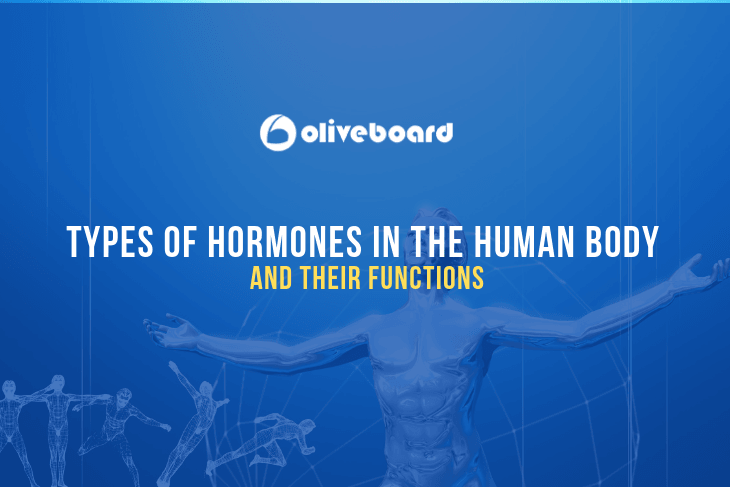Hormones are defined as chemical substances that help in coordinating the functioning and growth of living organisms in the human body. Different types of hormones have different functions and they all serve the body in their own ways in order to keep it healthy. All the major entrance exams these days test your knowledge in all aspects. In order to ensure that you do not fall short, make sure that your competitive exam preparation is up to the mark.
Types of Hormones and Functions:
Here is a list of different types of hormones present in the human body, and their functions-
- Insulin (Pancreas)
The pancreas located in the abdominal cavity of the stomach is responsible for secreting insulin.
This hormone helps the body to utilize the sugar or glucose obtained from the carbohydrates present in food, to produce energy and for storing glucose for future use. Additionally, insulin also helps in keeping the blood sugar levels normal.
- Thyroid hormones
The thyroid gland secretes two hormones primarily- Thyroxine (T4) and Triiodothyronine (T3), and they are responsible for regulating the body’s metabolism.
In addition, these two hormones control and determine the body’s energy levels, hair growth, skin condition, body weight etc.
- Progesterone
The hormone progesterone is produced in the female reproductive organ, known as the ovaries. It is generally produced when a woman gets pregnant and is responsible for many bodily functions.
Most importantly, progesterone prepares the body for pregnancy, conception and controls the monthly period cycles. In case, pregnancy does not happen, the progesterone levels drop and menstruation takes place.
- Estrogen
Estrogen is the one types of hormones which is female sex hormone that is released by the ovaries and is responsible for menopause, menstruation, and pregnancy. If the estrogen levels fluctuate, then it can cause a few bodily changes.
In case the levels drop, it can lead to hair fall, thinning skin, skin lesions, acne etc. Additionally, if estrogen levels are high then it can cause mood swings, depression, uterine cancer, breast cancer etc.
- Prolactin
Post-childbirth, the pituitary gland produces a hormone known as prolactin, which helps mothers to breastfeed.
During pregnancy, the prolactin levels shoot up and that contributes to fertility by inhibiting the gonadotropin-releasing hormone (GnRH) and the follicle-stimulating hormone (FSH).
- Serotonin
Serotonin is also known as the mood-enhancing hormone and is related to memory and learning, controls digestion, sleep, mood and a few muscular functions.
Fluctuations in the serotonin levels can have some serious effects. For instance, low levels of serotonin cause cravings of carbohydrates, insomnia, weight gain, migraine, depression etc. On the other hand, high levels of serotonin can lead to drowsiness, confusion, agitation etc.
- Testosterone
Testosterone is the male sex hormone that is responsible for the growth of muscles in the body. It plays a vital part in the development of vital reproductive organs in men, such as the prostate and the testes.
Additionally, it facilitates the growth of secondary characteristics such as the growth of body hair and increase in bone and muscle mass. Insufficient testosterone can cause bone weakness and bone fragility.
- Growth hormone
Also known as somatotropin hormone, ‘growth hormone’ is a protein hormone, which has 190 amino acids. Secreted and synthesized by the somatotroph cells present in the anterior pituitary, these amino acids works towards boosting metabolism, cell regeneration, cell reproduction, and growth.
- Adrenaline
Adrenaline is secreted by the adrenal gland and helps the human body to respond and think quickly when stressed. In case of stressful situations, adrenaline is released in the blood, which then conveys impulses to organs in order to generate a specific response.
It helps in the dilation of blood vessels going to the brain and heart and hikes up the metabolic rate.
- Cortisol
The main aim of cortisol secreted by the adrenal gland is to control psychological and physical stress. In case of any difficult stressful situations, cortisol helps in regulating the blood pressure, increases the heart rate, respiration etc.
Low levels of cortisol can lead to chronic fatigue syndrome, alcoholism etc. Similarly, high levels of cortisol can cause high levels of cholesterol, anxiety, high blood pressure, ulcer etc.
This Mock test will help you to crack MBA Entrance exam
Conclusion
If you are preparing for your MBA entrance exam, then it will serve you well to know about all this.

The most comprehensive online preparation portal for MBA, Banking and Government exams. Explore a range of mock tests and study material at www.oliveboard.in
